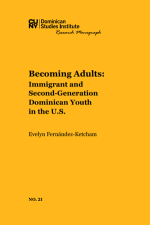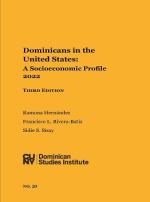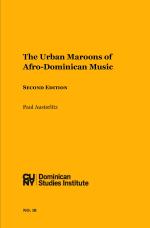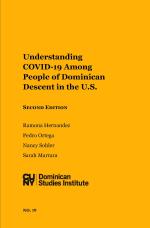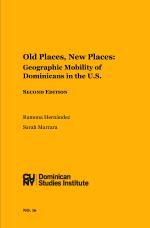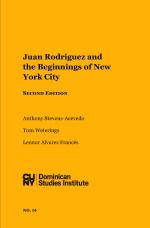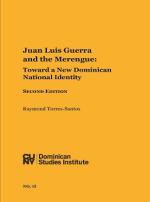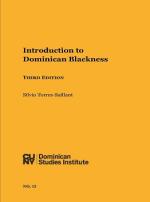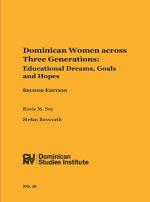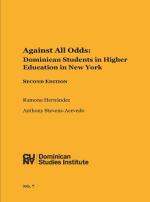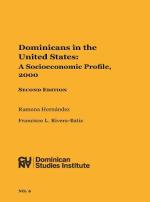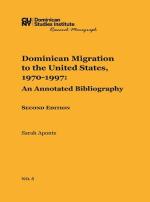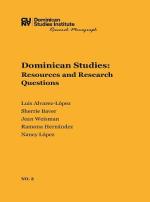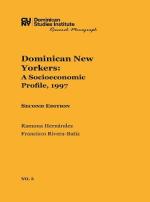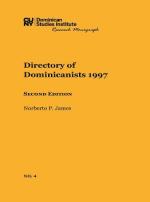Evelyn Fernández-Ketcham
Becoming Adults: Immigrant and Second-Generation Dominican Youth in the U.S.
2025. 75pp.
Becoming Adults: Immigrant and Second-Generation Dominican Youth in the U.S. offers new evidence on the question of developmental studies, particularly in relation to the stage that covers the transition to adulthood. The publication at hand provides strong added value by introducing new demographic groups, new scenarios, and new methods to examine the youth experience.
Links: PDF, Amazon (Paperback), Amazon (Kindle eBook)
Ramona Hernández, Francisco L. Rivera-Batiz and Sidie S. Sisay
Dominicans in the United States: A Socioeconomic Profile 2022
2022. 82pp.
This research presents the first detailed study of the socioeconomic status of the Dominican population of the United States as we enter the second decade of the 2000s, using information provided by the American Community Survey, the Current Population Survey and the United States Census.
Links: PDF, Amazon (Paperback), Amazon (Kindle eBook)
Paul Austerlitz
The Urban Maroons of Dominican Music
2022. 44pp.
This monograph examines manifestations of Afro-Dominican music, dance, and spirituality in the Dominican Republic and in the United States serving as a powerful counter-narrative of blackness asserting Dominicans’ valorization of their negritude.
Links: PDF, Amazon (Paperback), Amazon (Kindle eBook)
Ramona Hernández, Pedro Ortega, Nancy Sohler and Sarah Marrara
Understanding COVID-19 Among People of Dominican Descent in the U.S.: A Comparison of New York, New Jersey, Florida, Massachusetts, Pennsylvania, Rhode Island and Connecticut.
2022. 32pp.
The first research study to examine the experience of people of Dominican origins residing in the United State amidst the COVID-19 pandemic. It is based on a survey with a probabilistic and representative sample of 794 people of Dominican descent across the seven states in which the majority—85%—of Dominicans living in the U.S. resided at the time of the study.
Links: PDF, Amazon (Paperback), Amazon (Kindle eBook)
Anthony Stevens-Acevedo
The Santo Domingo Slave Revolt of 1521 and the Slave Laws of 1522: Black Slavery and Black Resistance in the Early Colonial Americas
2019. 65pp.
This volume disseminates for the first time ever a full English translation of a seminal document in the history of Black people in the Americas: the January, 1522 “ordinances on slaves and blacks” issued by the colonial government of La Española or Santo Domingo (known in English as Hispaniola), the first post-1492 European settlement in the Americas and, at the same time, the first black-majority society in the modern Americas and the ancestor society of what is today the Dominican Republic.
Links: PDF, Amazon (Paperback), Amazon (Kindle eBook)
Ramona Hernández and Sarah Marrara
Old Places, New Places: Geographic Mobility of Dominicans in the U.S.
2015. 24pp.
The aim of the study is to document internal migration patterns of Dominicans in the U.S., comparing international migrants and domestic migrants.
Links: PDF, Amazon (Paperback), Amazon (Kindle eBook)
Anthony Stevens-Acevedo, Tom Weterings and Leonor Álvarez Francés
Juan Rodriguez and the Beginnings of New York City
2013. 65pp.
This study offers a historical overview of the little-known story of Juan Rodriguez, a dark-skinned free man from the Spanish colony of La Española (today the Dominican Republic and the Republic of Haiti) who arrived in the Hudson Harbor in 1613 on board a Dutch ship and stayed there until at least 1614.
Versión en español: Juan Rodríguez y los comienzos de la ciudad de Nueva York. Traducido por Angel Estévez. Publicado en colaboración con el Archivo General de la Nación. Santo Domingo, República Dominicana, 2014.
Links: PDF, Amazon (Paperback), Amazon (Kindle eBook)
Raymond Torres-Santos
Juan Luis Guerra and the Merengue: Toward a New Dominican National Identity
2013. 19pp.
This research monograph offers a brief historical account about the development of merengue in the Dominican Republic from the late 1800’s to the present.
Links: PDF, Amazon (Paperback), Amazon (Kindle eBook)
Silvio Torres-Saillant
Introduction to Dominican Blackness
2012. 64pp.
This seminal study is a reflection on the complexity of racial thinking and racial discourse throughout the history of the Dominican Republic. It discusses how Haiti, the U.S., and the brutal legacy of colonialism have had an impact on what it means to be black within the Dominican Republic.
Links: PDF, Amazon (Paperback), Amazon (Kindle eBook)
Ramona Hernández and Pedro Ortega
Estudio comparativo sobre la vida cotidiana de la población de descendencia dominicana residente en los condados del Bronx y Manhattan en la ciudad de New York
2010. 33pp.
This study provides the first analysis of the findings from a survey of 636 persons of Dominican descent residing in Manhattan and the Bronx. The survey was conducted in collaboration with the Survey Research Unit of Baruch College. In the survey, heads of households were interviewed about everyday life issues. The study was released on December 1, 2010 at Fundación Global Democracia y Desarrollo in Santo Domingo, Dominican Republic.
Links: PDF, Amazon (Paperback), Amazon (Kindle eBook)
Ramona Hernández, Lincoln Restler and Greysi Peralta
Understanding Financial Behavior among Dominicans in New York City
2010. 59pp.
The aim of the study was to enhance understanding of the fiscal habits and financial literacy of Dominicans in the New York City area and to produce data that can be used to compare the experiences of Dominicans with other Latino communities in the United States. In addition, this study seeks to inform policy makers and community leaders in designing approaches that will effectively address financial asset building and management within the Dominican community. The study relied on a survey conducted with 613 persons of Dominican descent.
Links: PDF, Amazon (Paperback), Amazon (Kindle eBook)
Jorge Duany
Quisqueya on the Hudson: The Transnational Identity of Dominicans in Washington Heights
2008. 70pp. (Second edition with an updated and expanded introduction). (First edition: Released in 1994. 54 pp.)
This field research study of ethnic identity, popular culture, and everyday life of the Dominican community of Washington Heights examines the social adaptation of Dominican immigrants to the host country.
Links: PDF, Amazon (Paperback), Amazon (Kindle eBook)
Melissa Madera
'Never Forget Syphilis': Public Health, Modernity and Gender in the Discourse of Previsión Social during the Trujillato
2008. 24pp.
This is an introduction to the study of public health during the dictatorship of Rafael Leonidas Trujillo Molina (1930-1961). The essay shows how the dictatorship sought to advance the regime's agenda of patriarchal modernity making women responsible for the health of the nation. The essay extensively cites issues of the periodical publication Previsión Social.
Links: PDF, Amazon (Paperback), Amazon (Kindle eBook)
Rosie M. Soy and Stefan Bosworth
Dominican Women across Three Generations: Educational Dreams, Goals and Hopes.
2008. 50pp.
This study explores the struggle of Dominican women to access formal education and the impact of such access in their lives and on their own perceptions of their experiences. The essay captures the voices of female members of three generations of Dominican immigrant families in New York City.
Links: PDF, Amazon (Paperback), Amazon (Kindle eBook)
Ramona Hernández and Anthony Stevens-Acevedo
Against All Odds: Dominican Students in Higher Education in New York
2004. 56pp.
A joint publication with the Fundación Global Democracia y Desarrollo, this study details the status of the Dominican student population in New York City, drawing mostly on data from the 2000 U.S. Census and from the Office of Institutional Research of the City University of New York. CUNY is one of the largest public, urban universities in the United States.
Links: PDF, Amazon (Paperback), Amazon (Kindle eBook)
Ramona Hernández and Francisco Rivera-Batiz
Dominicans in the United States: A Socioeconomic Profile, 2000
2003. 73pp.
This study provides a statistical account of the situation of Dominicans living in the United States using the 1990 U.S. Census data.
Links: PDF, Amazon (Paperback), Amazon (Kindle eBook)
Sarah Aponte
Migration to the United States, 1970 - 1997: An Annotated Bibliography
1999. 178pp.
This is an annotated listing of books, scholarly articles, and chapters on Dominican migration providing an important reference guide for the study of Dominican migration from the 1970s to 1997 (with a 1998 addendum).
Links: PDF, Amazon (Paperback), Amazon (Kindle eBook)
Luis Alvarez-López, Jean Weisman, Sherrie Baver, Ramona Hernández and Nancy López
Dominican Studies: Resources and Research Questions
1997. 78pp.
This collection of bibliographies, research reports, listings of resources, and discussions of research question, gathers the results of various projects sponsored by the Dominican Studies Institute.
Links: PDF, Amazon (Paperback), Amazon (Kindle eBook)
Ramona Hernández and Francisco Rivera-Batiz
Dominican New Yorkers: A Socioeconomic Profile, 1997
1997. 72pp.
This study details the socioeconomic status of the Dominican population in New York City during the 1990s, drawing mostly on 1996 data provided by the U.S. Current Population Survey.
Links: PDF, Amazon (Paperback), Amazon (Kindle eBook)
Norberto James
Directory of Dominicanists 1997
1998. 78pp.
This Directory provides a list of US-based scholars working on Dominican topics.
Links: PDF, Amazon (Paperback), Amazon (Kindle eBook)
Ramona Hernández, Francisco Rivera-Batiz and Roberto Agodini
Dominican New Yorkers: A Socioeconomic Profile 1990
1995. 56pp.
Published in collaboration with the Institute for Urban and Minority Education (IUME) at Teachers College, Columbia University, this is the first academic effort to provide a statistical account, using the 1980 and 1990 U.S. Census data, of the current situation of Dominicans living in New York.
Links: PDF, Amazon (Paperback), Amazon (Kindle eBook)
Last Updated: 11/11/2025 12:15
